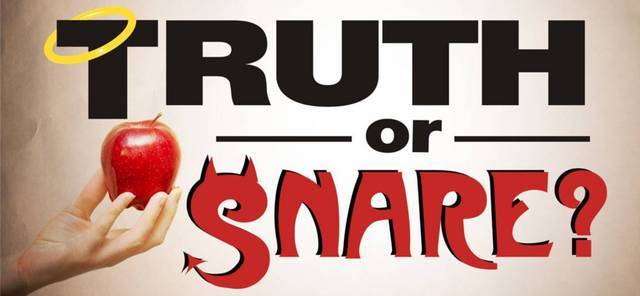 Submitted by Claire de Lune on
Submitted by Claire de Lune on

Truth is one of the central subjects in philosophy. It is also one of the largest. Truth has been a topic of discussion in its own right for thousands of years. Moreover, a huge variety of issues in philosophy relate to truth, either by relying on theses about truth, or implying theses about truth.
"What is truth?" is a very simple question. Of course, answering it isn't so simple. We can offer definitions like "Truth is that which conforms to reality, fact, or actuality." But this basic definition is not complete because its definition is open to interpretation and a wide variety of applications. What is reality? What is fact? What is actuality? How does perception affect truth? We could offer answers for each of these questions, but then we could again ask similar questions of those answers. I am reminded of the paradox of throwing a ball against a wall. It must get half way there, and then half way of the remaining distance, and then half of that distance, and so on. But, an infinite number of halves in this scenario never constitutes a whole. Therefore, it would seem that the ball would never reach the wall if we applied the conceptual truths of halves.
The ball-against-the-wall scenario simply illustrates that defining and redefining things as we try to approach a goal actually prevents us from getting to that goal. This is what philosophy does sometimes as it seeks to examine truth. It sometimes clouds issues so much, that nothing can be known for sure.
But, even though it is true that an infinite number of halves (1/2 of "a" + 1/2 of the remainder + 1/2 of the remainder of that, etc.) does not equal a whole, we can "prove" that it does by simply throwing a ball at a wall and watching it bounce off. Actually, the "1/2" equation above does not equal a whole -- mathematically. The problem is not in the truth but in its application, as is often the case with philosophical verbal gymnastics.
In order for truth to be defined properly, it would have to be a factually and logically correct statement. In other words, it would have to be true. But, perhaps we could look further at truth by determining what it is not. Truth is not error. Truth is not self-contradictory. Truth is not deception. Of course, it could be true that someone is being deceptive, but the deception itself isn't truth.
In relativism, all points of view are equally valid and all truth is relative to the individual. If this were true, then it would seem that this is the only truth relativism would have to offer. But, the problem is that in reality, relativism isn't true for the following basic reason. If what is true for me is that relativism is false, then is it true that relativism is false? 1) If you say no, then what is true for me is not true and relativism is false. 2) If you say yes, then relativism is false. Relativism seems to defy the very nature of truth; namely, that truth is not self-contradictory.
If there is such a thing as truth, then we should be able to find it. If truth cannot be known, then it probably doesn't exist. But, it does exist. For example, we know it is true that you are reading this.
Is there such a thing as something that is always true all the time? Yes, there is. For example, "Something cannot bring itself into existence." This is an absolutely true statement. In order for something to bring itself into existence, it would have to exist in order to be able to perform an action. But if it already existed, then it isn't possible to bring itself into existence since it already exists. Likewise, if it does not exist then it has no ability to perform any creative action since it didn't exist in the first place. Therefore, "Something cannot bring itself into existence" is an absolute truth.
The preceding example is a truth found in logic, but there are truths that are not logical by nature. It is true that I love my wife. This isn't logically provable via theorems and formulas and logic paradigms, but it is, nevertheless, true. Therefore, we can say that truth conforms and affirms reality and/or logic.
Is this what relativism does? Does relativism conform to reality and logic? To be honest, it does to some degree. Relatively speaking, there is no absolute right or wrong regarding which side of your head you should part your hair, if you part it at all. To this we must concede relative "truths" that are different for different people. But, these are relativistic by nature. Examples of relativistic truths are: 1) people drive on the right side of the street in America and the left in England; 2) I prefer to watch science fiction over musicals; 3) snow is better than rain, etc. These things are relative to culture, individuals, preferences, etc., and rightfully so.
If we ever hope to determine if there is such a thing as truth apart from cultural and personal preferences, we must acknowledge that we are then aiming to discover something greater than ourselves, something that transcends culture and individual inclinations. To do this is to look beyond ourselves and outside of ourselves. In essence, it means we are looking for God. God would be truth, the absolute and true essence of being and reality who is the author of all truth. If you are interested in truth beyond yourself, then you must look to God.
Matt Slick
- 1189 reads